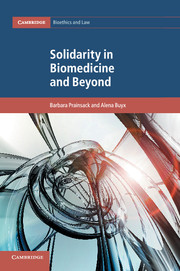Book contents
- Frontmatter
- Contents
- Foreword
- 1 Solidarity: A Brief History of A Concept and A Project
- PART I Theorising Solidarity
- PART II Solidarity in Practice
- 5 Solidarity in Practice I: Governing Health Databases
- 6 Solidarity in Practice II: Personalised Medicine and Healthcare
- 7 Solidarity and Organ Donation
- PART III Conclusions
- Afterword
- Bibliography
- Index
- Books in the Series
7 - Solidarity and Organ Donation
from PART II - Solidarity in Practice
Published online by Cambridge University Press: 09 February 2017
- Frontmatter
- Contents
- Foreword
- 1 Solidarity: A Brief History of A Concept and A Project
- PART I Theorising Solidarity
- PART II Solidarity in Practice
- 5 Solidarity in Practice I: Governing Health Databases
- 6 Solidarity in Practice II: Personalised Medicine and Healthcare
- 7 Solidarity and Organ Donation
- PART III Conclusions
- Afterword
- Bibliography
- Index
- Books in the Series
Summary
Introduction
From their very beginnings, organ donation and transplantation have been subjects of intense scrutiny and debate (Kirk et al. 2014: chapter 1; Loewy 1989: chapter 9). Over the last three decades, organ transplantations have become standard medical procedures in all developed countries, following advances in intensive care medicine, immunosuppression and surgical technology (Kirk et al. 2014). Organ donation and transplantation have always been considered as a class of their own within medicine: they represent a practice that does not aim at healing a patient's failing organ, or to improve its function with the help of a drug or a medical intervention, but that replaces it fully by an organ from another person. Organs are special also because unlike blood, cells or tissue, they cannot be fully regenerated in the donor. Hence donor organs are available only from deceased donors (like the heart, or lungs), or as part of paired or partly regenerative organs (such as kidney, liver). Anyone who has witnessed the radical change in health of the patient after a successful organ transplantation has seen how a new lease on life, literally, is given by transferring an organ from one person to another. At the same time, and partly due to the uniqueness of this type of intervention, it comes with many complex ethical and social issues – it is one of the ‘classic topics’ in medical ethics. From the very early days of transplantation medicine, almost every element of it has been controversial (for an early overview, see Fox and Swazey 1974, 1992). Initially, concerns revolved around the risks patients were subjected to. These took a back seat when the procedure changed status from a highly experimental treatment to becoming standard medical practice, mainly due to the revolution in immunosuppressant agents in the early 1980s. There were also early critics for whom the transfer of an organ from a deceased person to a living one constituted medical hubris or an instance of playing God. Worries were expressed that recipients might find it difficult to live with another person's organ inside them, which some indeed did, particularly with heart transplantations.
- Type
- Chapter
- Information
- Solidarity in Biomedicine and Beyond , pp. 145 - 166Publisher: Cambridge University PressPrint publication year: 2017

